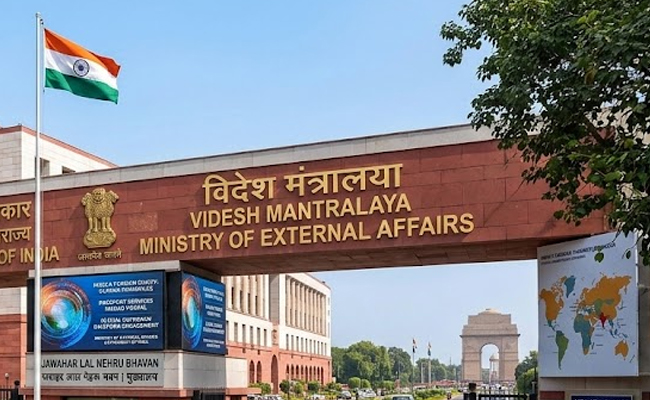Film: "Raid"; Starring: Ajay Devgan, Saurabh Shukla; Director: Raj Kumar Gupta; Rating: **** (4 stars)
Just when you think the Bollywood thriller is running out of steam there comes "Raid", a film so taut and clenched, so caustic and brimming with political sarcasm that you wonder where was director Raj Kumar Gupta hiding himself for so many years?
So yes he made "Ghanchakkar". We all make mistakes, okay? Not that I minded Gupta's unexpected swing into zany comedy. But smartly-spun, tautly-narrated political thrillers are his forte. "Aamir" and "No One Killed Jessica" had proved it. "Raid" proves it again.
So welcome back, Mr Gupta. Here's your deal. An honest-to-goodness income tax officer, played with incorruptible smoothness by Ajay Devgn, who gives away nothing (at least, nothing that we can see on his face) is pitched against a burly swarmy corrupt seedy politician in the hotbed of Lucknow's politics.
What happens when Amay Patnaik (Devgn) takes on Rameshwar Singh (Saurabh Shukla) on the latter's home turf? Strongly imbued in the spirit of social reform, the Idealistic Bureaucrat as revisited in this film, is a bit of an anomaly. Devgn's Amay fights that very system which has created him. Idealistic heroes tend to come across as single-minded implacable determined bullies. Devgan is all of this. It is remarkable how willingly he lets Saurabh Shukla chew up every scene in which they're together.
Editor Bodhaditya Banerjee slicesA across the large canvas of characters to capture people in their most anxious moments. It's a narrative of tremendous tension and nervous anxieties but never surrendering to a frenzied cutting-away of the material to play on the urgency of the moment.
It's done in the spirit of a pre-determined moral battle, a raider's Ramayan so to speak, that the plot so doggedly takes on in the pursuit of a Good versus Bad morality tale where the winner often appears to be a loser because he is so one-note in his determined idealism.
Saurabh Shukla has all the fun. And Devgan lets him. It is this spirit of passive resistance that the narrative so virilely assumes that makes "Raid" a riveting watch. The more Devgan's goodness shines down on the plot, the more Shukla's decadent corruption showers its reeking beneficence down on the plot that ironically gets its sustenance not from Devgan's Rama-like heroism but Shukla's Ravan-esqe rhetorics.
While Devgan and his raiders of the lost assets pool their talents to create a moribund army of wealth retrievers, the film's fuel surcharge comes from the heated exchanges between the bureaucratic hero and the political renegade. The two actors play against one other with brilliant brio.
The supporting cast is largely credible and sometimes remarkably engaging (Shukla's antiquated yet alert mother is a howl). But Ileana D'Cruz brought in for the sake of romantic glamour sticks out like a sore thumb with her patently Lakhnavi chikan-attired performance. Not her fault, though. What can she do when the plot is almost uniformly focused on its frenetic fight against wealth stealth with loads of savage humour and unexpected pauses to consider what makes corruption such a thriving industry in our country.
By the time the raid on Rajaji's ill-gotten wealth is over, the director has made a darkly humorous telling point on what it takes to call a dishonest politician dishonest.
Your job, perhaps. But hell, someone has to do the dirty job before another Jessica is killed randomly by a wealthy wayward reveler in a bar. Don't miss "Raid". One of its many pleasures is to watch the two principal actors in full control of their characters, even as the director guiding their exchanges, stands back to let the plot grow hot without burning itself out.
It takes a lot of will-power to stand back and let the corrupt steal the thunder from the incorruptible. "Raid" tells us virtuosity may be boring. But it is still a rare bird worth capturing in the palm of your hand.
Let the Truth be known. If you read VB and like VB, please be a VB Supporter and Help us deliver the Truth to one and all.
New Delhi (PTI): The Ministry of External Affairs (MEA) has set up a control room to assist those affected by the escalating crisis in West Asia.
The MEA has said almost one crore Indian citizens live in West Asia and their safety and well-being is of "utmost priority" for New Delhi.
As the Iran-US conflict widened, the Indian embassy in Iran moved hundreds of Indian students from the Iranian capital of Tehran to safer locations.
"A Control Room has been set up in the Ministry of External Affairs in view of the current situation in West Asia and the Gulf region," the MEA said on Wednesday.
"The Control Room can be contacted from 9 am to 9 pm at: 1800118797 (Toll Free) +91 11 2301 2113, +91 11 2301 4104, +91 11 2301 7905," it added.
The US launched military strikes on Iran on February 28, killing Iranian Supreme leader Ali Khamenei.
Following the military offensive, Iran has carried out a wave of attacks mainly targeting Israel and American military bases in several Gulf countries, including the UAE, Bahrain, Kuwait, Jordan and Saudi Arabia.
The MEA on Tuesday noted that almost one crore Indian citizens live and work in the Gulf region, and their "safety and well-being is of utmost priority."
"We cannot be impervious to any development that negatively affects them," it said.
The MEA said New Delhi will continue to closely monitor the evolving situation and take relevant decisions in the national interest, adding it is in touch with the governments in the region as well as other key partners.
A Special Control Room has been set up in the Ministry of External Affairs in view of the current situation in West Asia and the Gulf region. Details are as below ⬇️
— Randhir Jaiswal (@MEAIndia) March 4, 2026
🔗 https://t.co/nK3d6SY9Pa pic.twitter.com/v2EhUI5B1x




